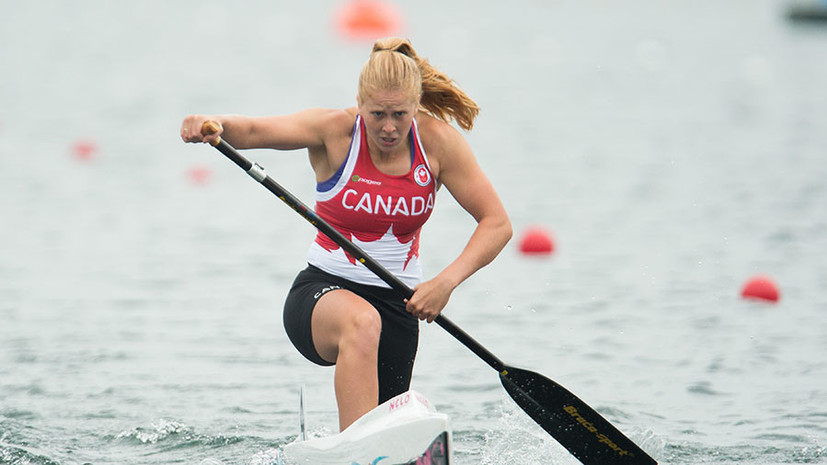In Hungarian Szeged kicked off the world championship in kayaking and canoeing. This year this competition has a special status - in addition to 30 sets of awards, quotas for the Olympic Games in Tokyo in 12 disciplines will also be drawn. Therefore, in Hungary, the best rowers have gathered at the moment, since nobody wants to postpone qualifications for the main start of the four-year period for the future.
However, there will not be one star participant in Szeged. Canadian canoeist Laurence Vincent-Lapoint misses the World Cup due to a positive doping test, which was passed in preparation for the competition. The athlete has been suspended and is now awaiting a detailed hearing from the International Kayaking and Canoe Federation (ICF).
Vincent-Lapoint is a symbol of women's canoeing - since this discipline began to develop and was included in the program of the World Championships in 2010, the Canadian won 11 gold medals. A year ago, she excelled in a single canoe at 200 and 5000 meters, as well as in a two-canoe at 500 meters with Katie Vincent. A year later, the women's canoe debuted in two disciplines at the Olympic Games, and the 27-year-old athlete was the main contender for both gold medals.
However, now her sports career is in jeopardy. In July, Vincent-Lapoint passed an out-of-competition doping test, which showed the presence of ligandrol in her body - a selective androgen receptor modulator (SARM), also known as LGD-4033. All types of SARM are included in the prohibited list of the World Anti-Doping Agency, as they help to gain muscle mass and improve physical performance. Starting January 1, 2018, ligandrol is listed separately on the list as one example of a SARM.
When a positive test became known, the Canadian Kayaking and Canoeing Federation (CKC) said they took the news “with great sadness”. The organization believes that Vincent-Lapoint did not specifically take the prohibited substance and intend to provide her with all the necessary assistance to prove her innocence.
“The CKC strongly believes in doping-free sports, but we also have good reason to believe that Lawrence has taken all the necessary anti-doping measures and that she unconsciously or unintentionally took the prohibited substance,” said organization head Casey Wade.
View this Instagram post
Publication by Laurence Vincent Lapointe🚣🏼♀️ (@laurence_vincentlapointe) Jul 22, 2019 at 12:22 pm PDT
The lawyer of the athlete Adam Klevinas intends to adhere to the same line. At a specially convened press conference, he said that the amount of the drug found indicates that it was contaminated with some other product that the athlete consumed.
“We must consider all options. Doping could not just appear in the body, so we must determine its source. We know that the concentration of the substance that was found in the Lawrence sample is comparable to contamination, and we are sure that the reason is not that she intentionally took it. Her case is currently under consideration by the ICF. We need to find out where the ligandrol came from, so that it could be allowed to participate in the Olympic Games next year, and after that we will think about the measures we need to take, ”Klevinas assured.
Vincent Lapointe herself hopes to appear at the Tokyo Olympics no matter what. She noted that she would not use doping, risking her own career.
“I will not abandon this dream. We will try to solve the problem as soon as possible and understand where the substance came from. But I do not want this to come to an end, so I will continue on my way. I take first place for almost ten years in a row. I know that I can defeat all my rivals exclusively on my own. Given my achievements, I don’t understand why I would risk everything in the run-up to the Olympic Games. I do not know how ligandrol came to me. We are trying to find the source. I can not believe this. This is some kind of nightmare. Everything that I worked for is destroyed, ”said Vincent-Lapoint.
Recently, this is the second high-profile case associated with ligandrol. Recently, Australian swimmer Shayna Jack fell into a similar story, who because of this missed the world championship in water sports in Gwangju. She also claims that she did not take the drug for muscle growth consciously.
According to the Australian Anti-Doping Agency, a prohibited substance could enter the body along with contaminated sports nutrition - the number of such cases increases every year and becomes a big problem for athletes who take supplements that are legal at first glance. Manager Jack Phil Stoneman also put forward the version that ligandrol could be in the athlete along with meat or mushrooms.
Both Jack and Vincent-Lapoint can face disqualification of up to four years. If they prove that the drug was ingested through no fault of their own, then removal can be reduced. Full justification is possible only if it is documented that the athletes were intentionally poisoned and became victims of sabotage.
In any case, it is highly likely that Vincent-Lapoint will no longer play at the Tokyo Summer Olympics. In her absence, the main rivals, including the Russians, have chances for gold. A year ago, at the World Championships, Olesya Romasenko became the silver medalist among single canoes at 200 meters, she, together with Irina Andreeva, took fourth place in a double canoe at 500 meters. In the non-Olympic types of women's canoe, Ksenia Kurach won personal gold and bronze together with Olesya Nikiforova.
In Szeged, Romasenko, Kurach and Daria Kharchenko will try to win Olympic licenses. In the absence of Vincent-Lapoint, this task will become less difficult. In the single canoe at 200 meters, the six best athletes will get quotas, in the canoe-double at 500 meters - the first eight.

